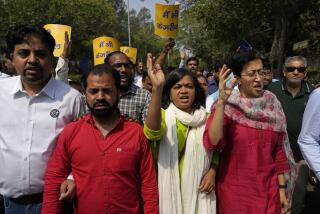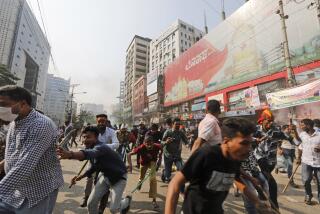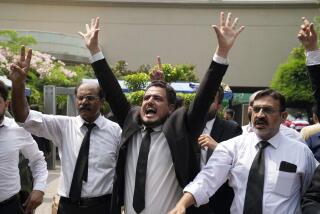Leader of Pro-Taliban Party Placed Under House Arrest
ISLAMABAD, Pakistan — In the latest move by President Pervez Musharraf to rein in extremists opposed to his government’s support of the U.S. military campaign in Afghanistan, an influential religious and political leader has been placed under house arrest.
The arrest of Qazi Hussain Ahmad, leader of the militantly pro-Taliban Jamaat-i-Islami party, came on the eve of a visit to Islamabad on Sunday by Defense Secretary Donald H. Rumsfeld. It followed the arrests of two other opposition party chiefs who have been vocal in their criticism of the U.S.-led bombing campaign and the Musharraf government.
The arrests, coupled with a general crackdown on dissent by the Pakistani government, helped set the stage for a national strike this week that opposition organizers have characterized as a test of public support for the Musharraf government. On Friday, the day set for the strike, Musharraf has planned a trip to the United States for meetings with President Bush and other administration officials.
Musharraf contends that a series of fiercely anti-American, anti-government demonstrations in Pakistan, which have received massive coverage from the more than 1,000 foreign journalists gathered here, has represented the views of a small minority of the population.
“We are a moderate Islamic country,” the president said in a recent interview. “There is no room whatsoever for religious extremism.”
Although some of the demonstrations in Pakistani cities have attracted tens of thousands of protesters, they are still relatively small in the context of the country’s volatile politics. Political rallies sometimes attract several hundred thousand participants.
“I don’t want to sound like a Pollyanna,” said a Western diplomat in Islamabad, the capital. “But so far, the Taliban has not been able to win over much Pakistan support here.”
Nevertheless, Musharraf last week ordered a general crackdown on public dissent--including a ban on political rallies and the use of loudspeakers in mosques for political purposes.
“Our basic aim is to avoid blood on the streets,” an official with the Interior Ministry said Sunday. “We do not want dead bodies. Increasingly, the protest meetings have become platforms for people calling for the downfall of Gen. Musharraf. That is not in the national interest, and we will not tolerate it.”
In response to the crackdown, opposition parties vowed Sunday to consolidate their actions, centered on Friday’s planned strike, to keep pressure on the Musharraf regime.
The participation of the Pakistan Muslim League--the party of former Prime Minister Nawaz Sharif--in the strike planning has raised concerns in the government that the protest base is broadening.
“The government does not want mainstream political parties to back the religious opposition, because that will add to the number of protesters and make it more difficult for us to manage them,” a military source here said Sunday.
Saturday’s arrest of Jamaat-i-Islami leader Ahmad followed the arrests in recent weeks of two other opposition leaders who support the strike: Maulana Fazlur Rehman, head of the fundamentalist Jamiat-ul-Ulema-e-Islam party, and Javed Hashmi, the Muslim League’s secretary-general.
A spokesman for Jamaat-i-Islami said Ahmad, a former member of parliament, was arrested Saturday night after he defied the ban on public protests.
On Friday, Ahmad presided over a demonstration in Mardan, a party stronghold 100 miles northwest of Islamabad, at which an estimated 6,000 people waved posters of Osama bin Laden and shouted “Death to Musharraf!” and “Death to America!”
Ahmad, confined to his residence in the northern frontier city of Peshawar under heavy police security, was scheduled to appear at a demonstration Sunday in the Bajaur border area in North-West Frontier Province. Several thousand armed Pakistani volunteers have assembled there to join Taliban forces inside Afghanistan.
According to Pakistani newspapers, more than 2,000 volunteers, called to a jihad, or holy war, by local religious leaders, had crossed the border by Sunday. The reports said more volunteers were waiting in nearby villages where the Taliban enjoys strong support.
In Rawalpindi, near Islamabad, about 200 demonstrators from the local chapter of Jamaat briefly blocked the street in front of a major newspaper chain Sunday to protest Ahmad’s arrest.
One of the protesters, Dr. Mohammed Afzal Ezaz, said the arrest was an attempt to take the steam out of Friday’s planned strike.
“Gen. Musharraf says the people are with him,” Ezaz said. “If that is true, why is he afraid? Why is he putting religious leaders under house arrest? I challenge him to come out to the streets and prove that the people are with him.”
More to Read
Sign up for Essential California
The most important California stories and recommendations in your inbox every morning.
You may occasionally receive promotional content from the Los Angeles Times.









